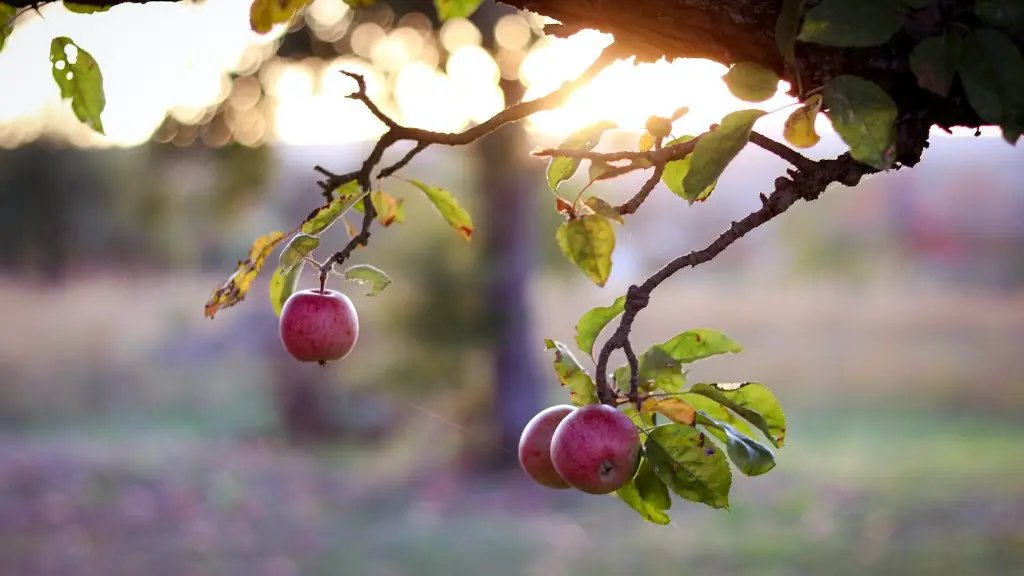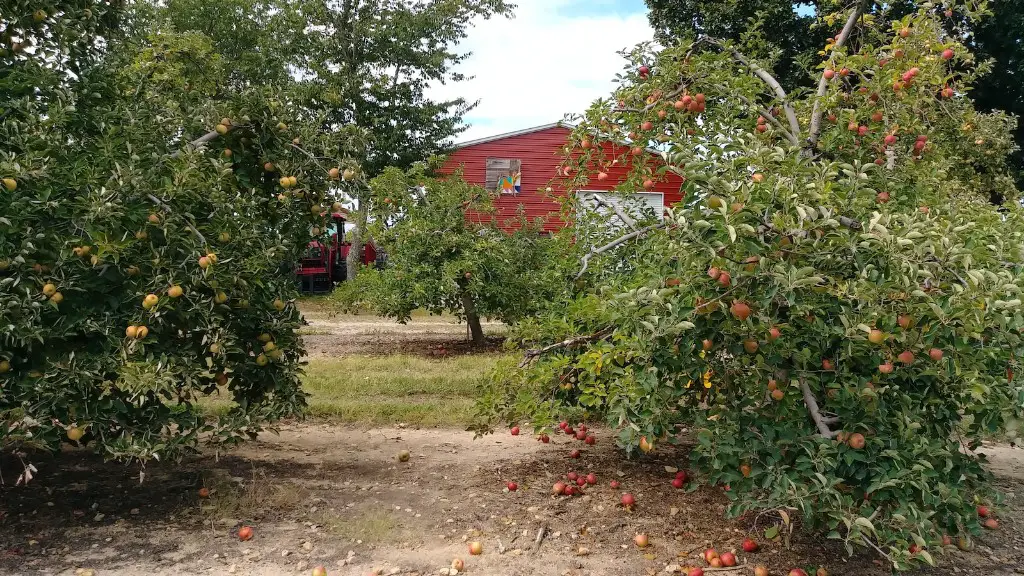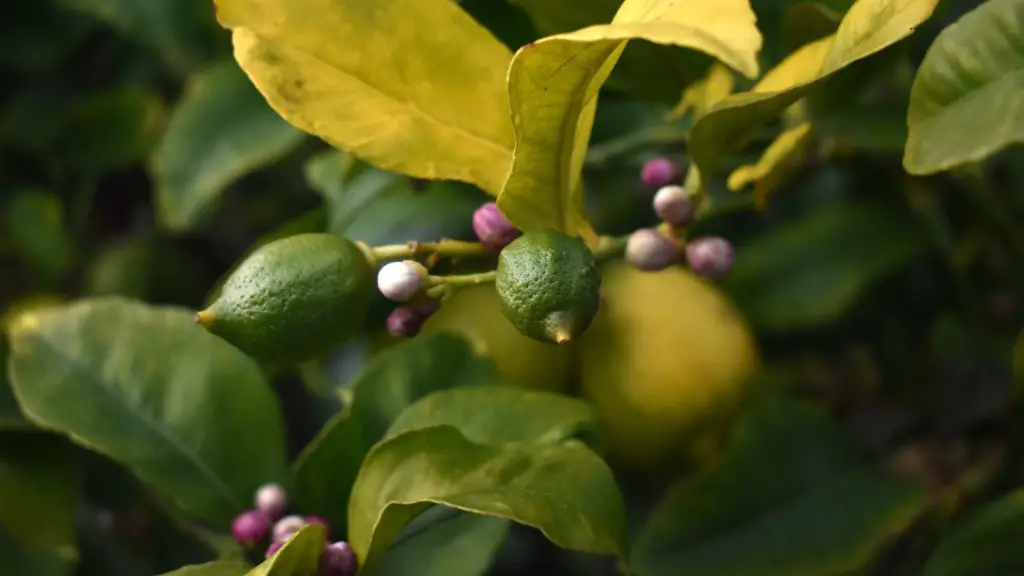Apples have been used in many cultures over time to represent unity, health, abundance, and fertility. But what is the science behind why apples can sometimes fall off a tree early? To answer this question, there are several factors we need to consider.
Firstly, it can depend on the type of apple tree. Some apple trees are bred specifically to produce early-harvest apples, such as those for storing and canning purposes, or for early-season consumption. The fruit may also be at a higher risk of falling due to the variety.
Secondly, nutritional deficiencies can weaken the tree, causing the apples to fall prematurely. If the tree isn’t getting enough nutrients from the soil, such as magnesium or potassium, it can weaken the entire tree, causing the apples to start dropping before it is time to harvest them.
Next, the weather can also play a role. If there is a period of excessive rainfall, it can cause the apples to become too waterlogged and eventually drop off the tree. Additionally, dry spells can cause the apples to shrivel and become more prone to falling.
Further, the amount of sunlight can have an effect, and any variation in light can cause a decrease in the tree’s ability to produce a good harvest. If the tree is in direct sunlight all day, it can cause the leaves to dry out and the apples to ripen quickly, prompting them to fall.
Moreover, any damage to the branches or trunk of a tree can cause the apples to fall off. If the tree has been seriously damaged by weather, pests, or any other type of damage, the apples may start to fall off very quickly.
Lastly, any changes in the environment or surrounding can cause apples to fall off prematurely. If the tree is removed from its natural environment, such as when it transplanted or moved to a new location, it can cause the apples to mature quickly and eventually fall off.
Temperature
The temperature can also be a major factor that causes apples to fall off early. If the temperatures become exceptionally hot, it can cause the apples to ripen too quickly, resulting in them falling off the tree before it’s time to pick them. This can be especially true in areas with higher humidity and heat, as the combined temperatures can have a more dramatic effect.
Conversely, cold temperatures can also cause apples to drop prematurely. If the temperatures become too cold, it can disrupt the tree’s pollination and growth. This can also cause the leaves to wilt and the apples to shrivel and fall off, leaving the tree with a much lower yield.
To prevent temperatures from having an effect on the apples, some apple trees can be put into standardizing rooms and orchards. These rooms and orchards are designed to keep the temperature at a constant temperature and humidity, allowing apples to remain on the trees for a longer period of time.
Additionally, some apple trees may be able to resist the effects of extreme temperatures for a longer period of time, allowing the apples to continue to grow and remain on the tree for a longer period. By understanding the different types of apples and how they respond to different temperatures, we can better insure that the apples won’t drop prematurely.
Diseases
Aside from environmental factors, there is also the risk of a tree being infected with diseases which can cause the apples to fall prematurely. Common diseases that can infect apple trees are apple scab, cedar apple rust, and fire blight. These diseases can weaken the tree and, in turn, can cause the apples to drop off prematurely.
Fortunately, these diseases can be prevented and treated with good hygiene and sanitation, as well as with proper insect control. For example, if there is an infestation of pests on the tree, it should be treated as soon as possible to prevent the spread of the disease and to keep the tree healthy. Additionally, it is important to keep the area around the tree clean and free of debris or other sources of contamination, as this can also spread diseases.
Also, an infected tree may be able to be treated with fungicides and other treatments, which can help to prevent the spread of the disease. This might allow the apples to remain on the tree until they are ready to be picked.
Pruning
Pruning is another way to keep apples from falling off prematurely. Pruning can help reduce the amount of wind, rain and other sources of damage, which can increase the chances that the apples can stay on the tree for a longer period. By properly pruning a tree, it can help reduce the risk of weather-related damage and help increase the yield of the harvest.
In addition, pruning can also be beneficial in improving air circulation and light penetration throughout the tree and its canopy. This can help to keep the tree from becoming too shady and can also help reduce the risk of disease. Furthermore, pruning can also help reduce pest infestations, helping to keep the tree healthy and strong.
It is important to properly prune a tree and to ensure that the pruning is done according to the growth needs of the tree. This can help to ensure that pruning is beneficial and doesn’t have any negative effects on the tree.
Picking Process
Finally, it is important to consider the picking process when it comes to apples falling off the tree prematurely. If the apples are not picked in a timely manner, then this can be a prime opportunity for gravity to take over. By waiting too long to pick the apples, they can often become too heavy and fall off the tree, resulting in a much lowered harvest.
This brings up the importance of proper harvesting techniques. It is important to pick apples early enough to prevent them from falling off the tree, but not too early that they are unmarketable. Additionally, if the apples are picked too early, this can cause damage to the other fruits and leaves on the tree, making them more prone to diseases, pests, and premature dropping.
By understanding the proper technique of picking apples and being aware of the possible reasons why apples may fall off the tree prematurely, we can help lessen the amount of crop loss due to apple dropping. This can be especially important to farmers, as it helps to insure their crops are yielding the best they can be.



